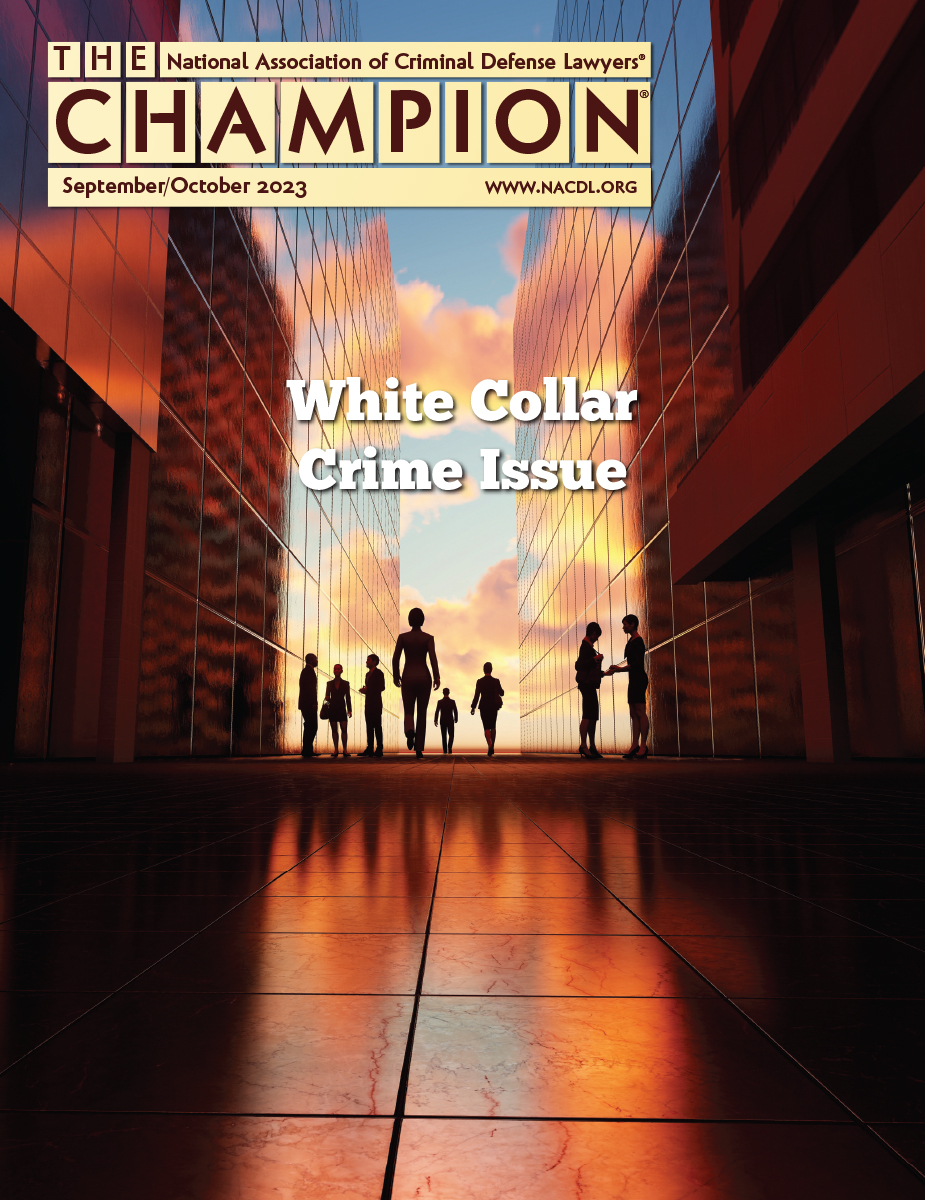September/October 2023

Jim Brosnahan reveals 10 lessons for trying white collar criminal cases.
Articles in this Issue
-
10 Lessons for Trying White Collar Criminal Cases
White collar cases are complex, and the clients in these cases are often part of society’s higher social strata. From “being bold” at the first meeting with the client to dealing with the client’s desire to talk to the press, veteran defense attorney Jim Brosnahan offers 10 tips that will make a white collar representation smoother.
-
Affiliate News
What events are NACDL affiliates hosting this month? Find out here.
-
Bill Summers: A Tireless Love of the Law
NACDL remembers the influence of William "Bill" Summers.
-
Book Review: The Riders Come Out at Night by Ali Winston and Darwin BondGraham
This month Julian Hope Wallace reviews The Riders Come Out at Night: Brutality, Corruption, and Cover-Up in Oakland by Ali Winston and Darwin BondGraham.
-
From the President: Let’s End Our ‘Two-Tiered’ Criminal Legal System
(But First, Let’s Define What This Means)
The criminal legal system is broken and will remain so until those with power to effect change listen to the people who, for decades, have been marginalized, abused, and victimized by this financially segregated and socially biased system.
-
Guarding and Utilizing Mobile Phone Data: A Guide for White Collar Practitioners
White collar lawyers must weigh various considerations in determining how to obtain mobile phone data or limit the government’s access to data. When can the government compel a client to provide the passcode to a mobile device? What is the significance of whether an executive’s mobile phone is owned by the executive or the corporation? This article provides tips about obtaining, protecting, preserving, and reviewing data on mobile phones.
-
In Tribute: Charles Ogletree, a Teacher of Presidents, Inspired Greatness by Example
Ronald S. Sullivan Jr. reflects on the influence of Charles J. Ogletree, Jr.
-
Intended Loss Under the Sentencing Guidelines
The Sentencing Guidelines provide for an increase in the offense level for most fraud or theft offenses based on the amount of “loss” determined by the court. Loss is not defined in the Sentencing Guidelines. However, the commentary defines loss as “the greater of actual loss or intended loss.” Megan Siddall explores a new argument that loss should be limited to actual loss – and not intended loss – in the wake of the Supreme Court’s decision in Kisor v. Wilkie.
-
NACDL News: NACDL Presents Four Awards at 2023 Annual Meeting
NACDL News for September/October 2023
-
NACDL News: Noted Fort Worth Attorney Michael Heiskell Installed as President of NACDL
NACDL News for September/October 2023
-
NACDL News: Summer Fellow Santana Kavanaugh Brings Human Rights Lens to NACDL’s Advocacy Projects
NACDL News for September/October 2023
-
NACDL News: Weiner Returns to Chicago-Kent to Deliver 2023 Commencement Address
NACDL News for September/October 2023
-
Perspective: Depression and the Practice of Criminal Law
How Depression Can Be a Ruthless Saboteur for the Criminal Defense Practitioner
Why are criminal defense lawyers especially prone to depression? What should lawyers do when their sixth sense tells them someone around them may be dangerously depressed?
-
Using Rule 17(c) to Obtain Materials From Third Parties
Rule 17 of the Federal Rules of Criminal Procedure provides the only means for a criminal defendant to obtain materials from third parties. Despite its broad language, the courts’ application of Rule 17 over the years has seriously limited its usefulness. Marci LaBranche and Carey Bell discuss problems with how the rule has been applied, the current state of Rule 17(c) practice, and how to make a record that encourages change.
-
White Collar Crime Policy: DOJ Issues New Corporate Guidelines and Pilot Program
on Employee Compensation Clawbacks
Department of Justice guidance issued in March 2023 provided prosecutors with a set of criteria to use when evaluating the compliance programs of corporations facing a resolution to criminal charges, such as a plea agreement, deferred prosecution agreement, or non-prosecution agreement.
